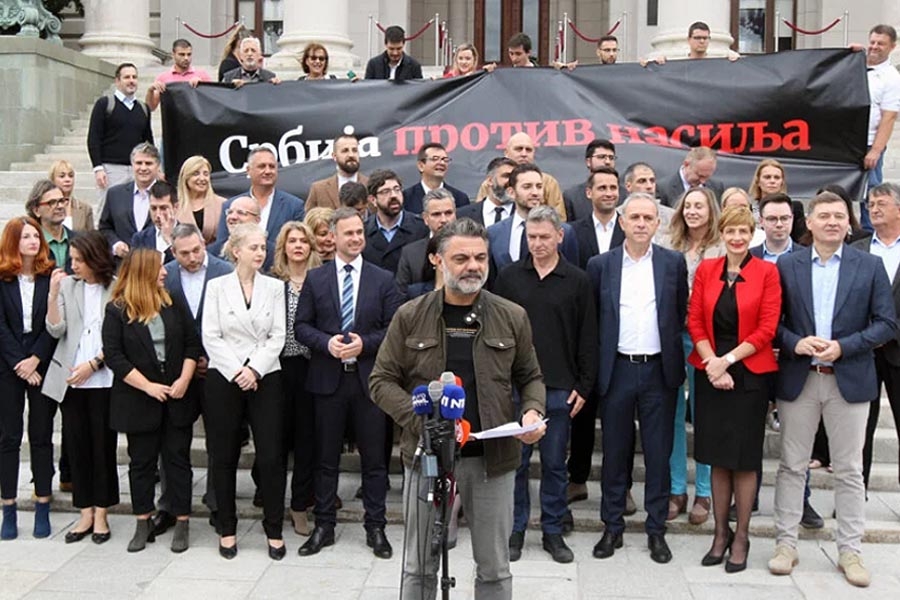Having in mind the current unequal conditions, until the next exit to the polls, it is necessary to ensure that the election rules, which still exist, are actually applied. This process should begin as soon as possible, without delay, since local elections will be held in a large number of municipalities in Serbia already this spring. One of the” recipes " for improving the extremely unfavorable electoral climate is that institutions in Serbia at all levels - executive, judicial and legislative, begin to function in a professional, objective and impartial manner.
A senior State Department official did not allude to a “grand coalition” of progressives and “Serbia against violence” in the new government, but showed that he is in favor of the opposition accepting the won parliamentary mandates, primarily in the National Assembly, Demostat concluded.
When it comes to the further path of “Serbia against violence”, Demostat estimates that the most important thing is that the leading opposition force remains united, in a solid alliance, and not that there is fragmentation, as has happened many times in the past with political groups opposed to the Milosevic and Vucic regimes. "Serbia against violence" declared unification only a month and a half before the December elections and in such a short time managed to attract a large number of supporters, as evidenced by the election results, which were achieved despite all the obstacles posed by the current regime.

Having in mind the current unequal conditions, until the next exit to the polls, it is necessary to ensure that the election rules, which still exist, are actually applied. This process should begin as soon as possible, without delay, since local elections will be held in a large number of municipalities in Serbia already this spring. One of the” recipes " for improving the extremely unfavorable electoral climate is that institutions in Serbia at all levels - executive, judicial and legislative, begin to function in a professional, objective and impartial manner.
A senior State Department official did not allude to a “grand coalition” of progressives and “Serbia against violence” in the new government, but showed that he is in favor of the opposition accepting the won parliamentary mandates, primarily in the National Assembly, Demostat concluded.
When it comes to the further path of “Serbia against violence”, Demostat estimates that the most important thing is that the leading opposition force remains united, in a solid alliance, and not that there is fragmentation, as has happened many times in the past with political groups opposed to the Milosevic and Vucic regimes. "Serbia against violence" declared unification only a month and a half before the December elections and in such a short time managed to attract a large number of supporters, as evidenced by the election results, which were achieved despite all the obstacles posed by the current regime.

James OBriens message that it is “very important” that representatives of the opposition are adequately represented in new state institutions, including Parliament, does not mean that this senior official of the US State Department advocates a” grand coalition “of Progressives and “Serbia against Violence” in the new government, but that he advocates that the opposition accepts the won seats, primarily in the National Assembly. At the same time, it is notable that OBrien, in a briefing for American journalists, said: “We see a significant change in the convocation of Parliament. Parties that offered only nationalism suffered defeat, some did not even cross the threshold. This statement is in line with the assessment of Demostats editorial that “Many opponents of the Franco-German plan for Kosovo remained below the electoral threshold (Vucic suggests that local elections in Belgrade will be repeated (demostat.rs).
James OBrien, US Assistant Secretary of State for Europe and Eurasia, said opposition groups “received more support, several hundred thousand votes and more mandates”. As he pointed out: “These two things tell me that we now have a potential governing coalition that is clear and responsible for bringing some results to its citizens. I think we will expect these groups to work together for their citizens and regional stability. If there are any legal challenges and something changes, we will respect that”. These assessments also support Demostats theses on the future convocation of the Republican Parliament.
Demostat stated: “If we look at the composition of the future convocation of the National Assembly from a mathematical point of view, we come to the conclusion that the ruling coalition of SNS and SPS so far, which had 151 mandates (winning 56.06 percent of the votes) achieved a worse result. Namely, at the moment they appear to have 146 seats in the total (winning 52.9 percent of the votes). On the other hand, the pro-European opposition, the “Serbia against Violence” list, received 65 mandates, which is a much better result than in 2022. This political option has about 15 more mandates, if we take into account the fact that in the last elections, the peoples party, which had eight mandates, was on the joint list”.
It is also important to mention that the leading opposition list, Serbia against Violence, received more votes than the Democratic Party in 2012, and slightly less than the SNS in the same year. At the same time, it surpassed the result of “Zajedno” coalition in the elections held in 1996.
Demostat also estimates that "Serbia against Violence" will not renounce its mandates in the National Assembly, and probably in the Assembly of the City of Belgrade. At the same time, it seems that the local elections in the capital city will be repeated, due to the inability to form a ruling majority.
OBrien also said that the United States would work with the authorities in Serbia to resolve issues related to electoral irregularities, stressing that “We welcome peaceful protests by citizens who think that the elections were not fair, that the results are not what they wanted“, but that “We want open issues to be resolved in the legal process and to produce a clear report on the outcome of the elections”, noting that “he talks about parliamentary, not local elections in Serbia”. Such claims by a high-ranking official show that Washington is well aware of numerous shortcomings that marked the election process in Serbia, i.e. the fact that the conditions were not fair and fair, but that the largest ruling party, the Serbian Progressive Party, used all available state resources, including public funds, in the campaign, i.e. that the so-called “official campaign” was conducted.
Having in mind the current unequal conditions, until the next elections, it is necessary to ensure that the election rules, which now exist, are actually applied. This process should begin as soon as possible, without delay, since local elections will be held in a large number of municipalities in Serbia already this spring. One of the “recipes” for improving the extremely unfavorable electoral climate is that institutions in Serbia at all levels - executive, judicial and legislative - begin to function in a professional, objective and impartial manner. According to a number of analyses of Demostat, including those conducted after the election held on December 17th, it is obvious that the institutions are highly politicized, i.e. in the service of the party in power. For instance, this was especially seen in the examples of the Republic Election Commission, the City Election Commission in Belgrade, and the exception to this infamous rule is neither the courts nor the prosecutors office.
When it comes to the further path of “Serbia against Violence”, Demostat estimates that the most important thing is that the leading opposition force remains united, in a solid alliance, and not to be fragmented, as has happened many times in the past with political groups opposed to the Milosevic and Vucic regimes. “Serbia against Violence” declared unification only a month and a half before the December elections and in such a short time managed to attract a large number of supporters, which is best evidenced by the already mentioned election results, which were achieved despite all the obstacles posed by the current regime.
According to our estimates, if “Serbia against violence” persists in unity, its growth will be unquestionable. Marinika Tepics hunger strike was a very brave personal act, which drew the attention of the European Union and the world to the “electoral pathology” in Serbia. Other major problems facing Serbia will continue in the coming months and years.
Among other things, the current economic situation promises nothing good, and the standard of living of most citizens is expected to deteriorate further, judging by the high rate of inflation and the huge state debts. At the same time, the concessions that the President of Serbia is already making and will be forced to continue making regarding the resolution of the Kosovo issue will negatively affect the popularity of the SNS. In the end, we should not forget the accumulated number of "big " affairs that have not been clarified so far, and it is difficult to hope that they will get an epilogue during the mandate of this government - such as Krushik, Jovanjica, Savamala…
In all societies there are issues that are rather being skipped. Certain...
The neoliberal path, started in 2001, has led to especially bad results in Serbi...
For centuries, the region was subsumed within the Ottoman and Hungarian Empires,...
"Serbia has returned to the systemic and anti-systemic position of the political...
In reality, Serbia is closer than ever to NATO. In the course of the last five y...